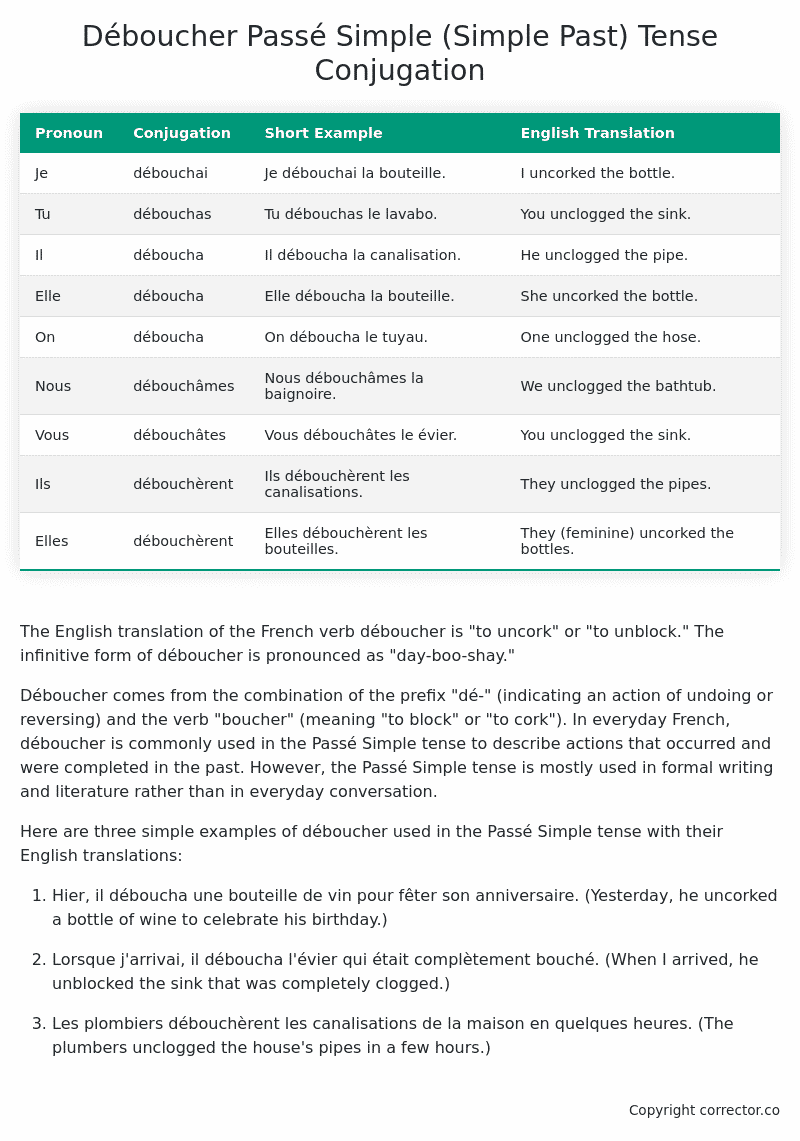Passé Simple (Simple Past) Tense Conjugation of the French Verb déboucher
Introduction to the verb déboucher
The English translation of the French verb déboucher is “to uncork” or “to unblock.” The infinitive form of déboucher is pronounced as “day-boo-shay.”
Déboucher comes from the combination of the prefix “dé-” (indicating an action of undoing or reversing) and the verb “boucher” (meaning “to block” or “to cork”). In everyday French, déboucher is commonly used in the Passé Simple tense to describe actions that occurred and were completed in the past. However, the Passé Simple tense is mostly used in formal writing and literature rather than in everyday conversation.
Here are three simple examples of déboucher used in the Passé Simple tense with their English translations:
-
Hier, il déboucha une bouteille de vin pour fêter son anniversaire.
(Yesterday, he uncorked a bottle of wine to celebrate his birthday.) -
Lorsque j’arrivai, il déboucha l’évier qui était complètement bouché.
(When I arrived, he unblocked the sink that was completely clogged.) -
Les plombiers débouchèrent les canalisations de la maison en quelques heures.
(The plumbers unclogged the house’s pipes in a few hours.)
Table of the Passé Simple (Simple Past) Tense Conjugation of déboucher
| Pronoun | Conjugation | Short Example | English Translation |
|---|---|---|---|
| Je | débouchai | Je débouchai la bouteille. | I uncorked the bottle. |
| Tu | débouchas | Tu débouchas le lavabo. | You unclogged the sink. |
| Il | déboucha | Il déboucha la canalisation. | He unclogged the pipe. |
| Elle | déboucha | Elle déboucha la bouteille. | She uncorked the bottle. |
| On | déboucha | On déboucha le tuyau. | One unclogged the hose. |
| Nous | débouchâmes | Nous débouchâmes la baignoire. | We unclogged the bathtub. |
| Vous | débouchâtes | Vous débouchâtes le évier. | You unclogged the sink. |
| Ils | débouchèrent | Ils débouchèrent les canalisations. | They unclogged the pipes. |
| Elles | débouchèrent | Elles débouchèrent les bouteilles. | They (feminine) uncorked the bottles. |
Other Conjugations for Déboucher.
Le Present (Present Tense) Conjugation of the French Verb déboucher
Imparfait (Imperfect) Tense Conjugation of the French Verb déboucher
Passé Simple (Simple Past) Tense Conjugation of the French Verb déboucher (You’re reading it right now!)
Passé Composé (Present Perfect) Tense Conjugation of the French Verb déboucher
Futur Simple (Simple Future) Tense Conjugation of the French Verb déboucher
Futur Proche (Near Future) Tense Conjugation of the French Verb déboucher
Plus-que-parfait (Pluperfect) Tense Conjugation of the French Verb déboucher
Passé Antérieur (Past Anterior) Tense Conjugation of the French Verb déboucher
Futur Antérieur (Future Anterior) Tense Conjugation of the French Verb déboucher
Subjonctif Présent (Subjunctive Present) Tense Conjugation of the French Verb déboucher
Subjonctif Passé (Subjunctive Past) Tense Conjugation of the French Verb déboucher
Subjonctif Imparfait (Subjunctive Imperfect) Tense Conjugation of the French Verb déboucher
Subjonctif Plus-que-parfait (Subjunctive Pluperfect) Tense Conjugation of the French Verb déboucher
Conditionnel Présent (Conditional Present) Tense Conjugation of the French Verb déboucher
Conditionnel Passé (Conditional Past) Tense Conjugation of the French Verb déboucher
Conditionnel Passé II (Conditional Past II) Tense Conjugation of the French Verb déboucher
L’impératif Présent (Imperative Present) Tense Conjugation of the French Verb déboucher
L’impératif Passé (Imperative Past) Tense Conjugation of the French Verb déboucher
L’infinitif Présent (Infinitive Present) Tense Conjugation of the French Verb déboucher
L’infinitif Passé (Infinitive Past) Tense Conjugation of the French Verb déboucher
Le Participe Présent (Present Participle) Tense Conjugation of the French Verb déboucher
Le Participe Passé (Past Participle) Tense Conjugation of the French Verb déboucher
Struggling with French verbs or the language in general? Why not use our free French Grammar Checker – no registration required!
Get a FREE Download Study Sheet of this Conjugation 🔥
Simply right click the image below, click “save image” and get your free reference for the déboucher Passé Simple tense conjugation!

Déboucher – About the French Passé Simple (Simple Past) Tense
Formation
Usage
Narration
Historical Context
Interactions with other tenses
Passé Composé
Imparfait
Conditional and Subjunctive
Summary
I hope you enjoyed this article on the verb déboucher. Still in a learning mood? Check out another TOTALLY random French verb conjugation!


